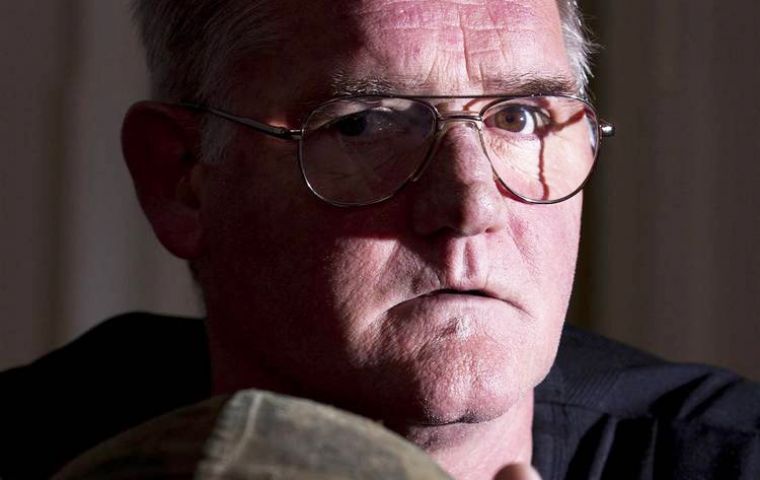MercoPress. South Atlantic News Agency
Soldier's helmet case still unclear, newspaper reports
 British veteran Gordon Hoggan claimes he killed an Argentine soldier with his bayonet (Pic AFP)
British veteran Gordon Hoggan claimes he killed an Argentine soldier with his bayonet (Pic AFP) British veteran of the 1982 Falklands War claims to have killed an Argentine soldier with his bayonette and now wants to give the helmet to the family, but... ¿did it happen as he says?
Buenos Aires daily newspaper Clarin Sunday dedicated a full page to the news of Gordon Hoggan, a Scottish-born veteran who was with Company G of the Scottish Guards during the attack on Mount Tumbledown on June 13 and 14, 1982, hours before the surrender. The last of the three onslaughts was against 40 Argentines of the 4th Section of the Nacre Company of the 5th Navy Infantry Batallion .
Since 2012 Hoggan has been in the limelight, speaking about the helmet he took from the islands. But now he wants to return it.
According to Clarin's article, written by Natasha Niebieskikwiat, weeks of consultations led to the conclusion that Hoggan's testimony pointed at Dragoon José Luis Galarza, who volunteered for action on the islands while doing compulsory military service in Rio Grande, Tierra del Fuego. According to retired Navy Captain Carlos Daniel Vázquez, leader of Galarza's unit at the time, the serviceman died of a bayonet wound in the chest at dawn on June 14.
Weeks ago, Miguel Galarza, father of José Luis, was quoted by Clarin as saying that if that was his son's helmet, he wanted it. A few days later, The Mail on Sunday cited sources accusing Hoggan of fabricating the story of the bayonet and helmet. The main argument is that Hoggan could not have killed any Argentine because Company G of the Scots Guards did not come across any foe on its path to Tumbledown.
Mike Seear, author of Return to Tumbledown, explained in numerous emails to Clarin that Hoggan and Galarza could never have met. Hoggan's testimony was used for the book, but Seear never gave a plausible reason as to why the war veteran would lie. In several telephone interviews with Clarin from his home in northern England, Hoggan has always stood by his story - that he killed an Argentine with a bayonet stroke to the neck.
Contradicting versions are also to be found on the Argentine side. Retired Rear-Admiral Carlos Robacio, Vazquez's superior within the Navy Infantry battalion, told Clarin that Galarza had died from gunshots. Vazquez's 4th company of 40 seems to have been stricken from the official records, even though it was the one that kept up the fight until the very end, the article explains. Pablo Rodriguez, another survivor of that group, said that Galarza did die from a bayonet stroke but explained it could not have been Hoggan who delivered it, because “we shot that English soldier dead”.
Even within the old group there are those who believe that veterans and veterans of the 4th section of the Shell should have received medals for valor in combat.
Quite a lot has been said about Tumbledown, where 20 Argentines and 9 Britons fell. According to Clarin, UK versions bring the total of dead enemies up to 30, while it has been heard in Argentina that 300 “English” were killed in that battle alone (when the total number of British casualties in the conflict reached 255).
The article does not address the chance that whomever Hoggan killed was not just Galarza.




Top Comments
Disclaimer & comment rules-

-

-

Read all commentsTotal rubbish. G Company Scots Guards composed of 7th, 8th and 9th platoons reached their positions on Mount Tumbledown unopposed.
Dec 22nd, 2014 - 12:56 pm 0Keep the helmet. Probably lost by an argie running for his life!
Let's imagine it happened as Hoggan says it did.
Dec 22nd, 2014 - 01:35 pm 0The dead blokes father sounds rather arrogant in this write up.
'If it was my son's, I want it'
It stopped being your son's property the moment somebody else's son, (whom your son would have killed given the chance) killed him, and won the item as a war trophy.
Hoggan needs psychiatric treatment.
Dec 22nd, 2014 - 02:10 pm 0He's been disowned by many in the Scots Guards and they are concerned that his recollection of events does not match those of the other members of his company, who reached their objectives on Tumbledown unopposed.
He did not take part in any fighting, but appears to be suffering from some form of Münchausen syndrome.
The symptoms are a history of recurrent hospitalization, travelling, and dramatic, untrue, and extremely improbable tales of their past experiences.
The illness gets its name from Baron Münchhausen (Karl Friedrich Hieronymus Freiherr von Münchhausen, 1720–1797), a German nobleman working in the Russian army, who purportedly told many fantastic and impossible stories about himself, which Rudolf Raspe later published as The Surprising Adventures of Baron Münchhausen.
Seems that Hoggan may be suffering some form of PTSD, but has fabricated a story about a soldier being bayoneted to draw attention to himself.
Maybe if he sat down with a Psychiatrist, he could sort out his real problem and stop telling fibs.
Commenting for this story is now closed.
If you have a Facebook account, become a fan and comment on our Facebook Page!